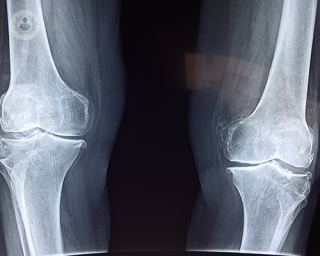Knee arthritis
Mr Tom Pollard - Orthopaedic surgery
Created on: 01-24-2019
Updated on: 11-09-2023
Edited by: Aoife Maguire
What is knee arthritis?
Arthritis of the knee is inflammation of the knee joints. It is characterised by pain, swelling, inflammation, and eventually, restriction in movement. Arthritis affects different joints in the body, but very commonly it affects the knees. Knee arthritis mainly affects adults, however, some types of knee arthritis can affect children.
There are different types of knee arthritis, of which knee osteoarthritis is the most common. Knee osteoarthritis is degenerative, developing through wear-and-tear and the wearing-away of knee cartilage between bones. Rheumatoid arthritis of the knee is a chronic autoimmune disease in which the synovial membrane in the knees become inflamed, causing pain and stiffness. Lastly, post-traumatic arthritis of the knee results following injury to the knees (e.g. after a broken bone or knee ligament tear).

Prognosis of knee arthritis
Knee arthritis is degenerative and it will worsen without treatment. We currently do not have a cure for knee arthritis, but treatments aim to relieve the symptoms of pain and disability.
Symptoms of knee arthritis
Knees affected by arthritis are commonly painful and inflamed (swollen). Other common symptoms associated with knee arthritis include:
- Pain and swelling that is more pronounced in the mornings or after a period of rest
- Physical activity causes pain to worsen
- The knee joint feels stiff
- With some movements, the knee feels like it can lock or grind
- Weakness in the joint
Medical tests to diagnose knee arthritis
To diagnose knee arthritis, you will have a thorough physical examination in which swelling, stiffness, pain, instability and signs of injury to the knee tissue will be assessed for. You will also have an X-ray of the affected knee, and occasionally you will have an MRI or CT scan. You may also have blood tests to determine which type of knee arthritis you have (i.e. for rheumatoid arthritis).
What are the causes of knee arthritis?
There are different factors that can cause or contribute to knee arthritis developing. These may include:
- Age (knee arthritis is more common in older age)
- Genetics (some types of knee arthritis may be inherited)
- Weight (being overweight can put bigger loads on your knees, causing more rapid wear-and-tear)
- Prior knee injury (previous injuries may cause your cartilage to wear away more quickly)
- Physical activity (if you are very active for either work or playing sports, your knees may be excessively used, bearing loads frequently)
Can knee arthritis be prevented?
Certain types of knee arthritis cannot be prevented, however, you can try to reduce the risk of the wear-and-tear varieties developing. For example, maintaining a healthy weight can help to reduce the load put on your knees, protecting the knee joint tissues from damage. It is also important to have any knee injuries treated, and any physiotherapy practised properly. Lastly, eating healthily and exercising to strengthen the knee joints are helpful, with the safest exercises for the knees being swimming and cycling.
Treatments for knee arthritis
Treatment for knee arthritis focuses on relieving the pain, inflammation and lack of mobility.
Non-surgical treatment of knee arthritis comprises of:
- Lifestyle changes (e.g. losing weight if you are overweight, doing low impact activities such as swimming)
- Physiotherapy (performing specific exercises to increase the range of motion and improve strength)
- Medication (anti-inflammatory medicines help to reduce swelling and NSAIDs help with the pain and inflammation too)
- Assisted devices (e.g. using a walking aid such as a walking stick, using a knee brace or wearing shock-absorbing shoes)
If your knee arthritis has progressed to the point that the pain and disability are not relieved by non-surgical treatments, surgery may be recommended.
Surgical treatments for knee arthritis include:
- Arthroscopy (a minimally-invasive procedure that allows repair of the knee tissue)
- Total or partial knee replacement (damaged tissue is removed and replaced with metal or plastic joint surfaces)
- Osteotomy (small cuts are made in the bones of the knee to relieve pain, pressure and improve knee function)
Which type of specialist treats knee arthritis?
Knee arthritis may be treated by orthopaedic surgeons or rheumatologists, depending on the type of knee arthritis you have.
















